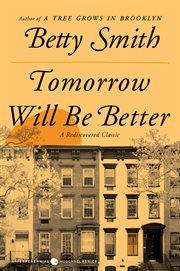Tomorrow will be better
eBook - 2020
"From Betty Smith, author of the beloved classic A Tree Grows in Brooklyn, comes a poignant story of love, marriage, poverty, and hope set in 1920s Brooklyn. Tomorrow Will Be Better tells the story of Margy Shannon, a shy but joyfully optimistic young woman just out of school who lives with her parents and witnesses how a lifetime of hard work, poverty, and pain has worn them down. Her mother's resentment toward being a housewife and her father's inability to express his emotions result in a tense home life where Margy has no voice. Unable to speak up against her overbearing mother, Margy takes refuge in her dreams of a better life. Her goals are simple-to find a husband, have children, and live in a nice home-one where her ...children will never know the terror of want or the need to hide from quarreling parents. When she meets Frankie Malone, she thinks her dreams might be fulfilled, but a devastating loss rattles her to her core and challenges her life-long optimism. As she struggles to come to terms with the unexpected path her life has taken, Margy must decide whether to accept things as they are or move firmly in the direction of what she truly wants. Rich with the flavor of its Brooklyn background, and filled with the joys and heartbreak of family life, Tomorrow Will Be Better is told with a simplicity, tenderness, and warmhearted humor that only Betty Smith could write. "
- Subjects
- Published
-
[United States] :
HarperCollins Publishers
2020.
- Language
- English
- Corporate Author
- Main Author
- Corporate Author
- Online Access
- Instantly available on hoopla.
Cover image - Physical Description
- 1 online resource
- Format
- Mode of access: World Wide Web.
- ISBN
- 9780062988690
- Access
- AVAILABLE FOR USE ONLY BY IOWA CITY AND RESIDENTS OF THE CONTRACTING GOVERNMENTS OF JOHNSON COUNTY, UNIVERSITY HEIGHTS, HILLS, AND LONE TREE (IA).
Review by Kirkus Book Review


